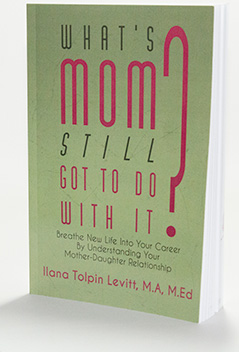As Mother’s Day came and went this year, I thought about all the women I know, clients and friends alike, whose careers have been impacted by having children. I’ve seen mothers struggling with career issues in many different ways – from stepping out of the work force, reducing to a part-time schedule, and transitioning industries – to accommodate their family life.
Working mothers face a bevy of practical issues surrounding their careers and families. Should I re-launch my career? Should I go back to school to learn new skills? Should I trust strangers to take care of my children while I’m at work? The resolutions to these questions are seldom 100% satisfactory or easy; most women go through a great deal of emotional conflict even if they know what they want to do. We are bombarded with two, recurring and frustratingly contradictory messages: “Go back to work, the economy is bad, households need to be dual income, husbands now do more to help, women can do it all!”, and, “The first few years are critical to bonding, stay at home, make sacrifices, our mothers did and so should you!” Society doesn’t help, since preschools close at 3:00 PM, school plays start at 10:30 AM, and teachers get out early for holidays — s anyone thinking about the working mother?
Nancy is a single mother of two children, ages 5 and 8. She works at least 40 hours each week, and finds time to juggle sports, class trips and doctors’ appointments, but her kids and other mothers want her on the PTA as well. It’s never enough. –Sorry Nancy, whatever decision you make, it will always be your fault. If a mother chooses to work instead of staying at home; if she decides to breastfeed her baby instead of using formula; if she chooses the cheaper diapers over the premium ones, the blame will rest on her. The field of psychology has evolved and helps us understand that disappointment in our parents is a normal and healthy developmental process. Theorists and psychologists have rightfully explained the idea of the “good-enough mother,” the imperfectly attentive mother who does a better job than the “perfect” one who risks stifling her child’s development.
Advice for working mothers abounds, of which the most usual kind run in the vein of:: Be confident; don’t be intimidated if you are returning to the workforce after a long absence; evaluate your career options; try to take on consulting assignments; network and market yourself; channel family support; be aggressive. But is this the right kind of advice? I don’t think so.
It’s not that it’s bad advice, all of those tips are very good, but it just isn’t geared towards the segment of women who need it the most. The women to which this advice would apply are probably already following it – they have a clear idea of what they want to do and how to get there. The mothers who need advice are the women who have stopped working after their children are born, and, whose entire identify is centered on being “Jake’s mom” or “Brian’s wife”; while they love the family members they take care of, they want to be more than an extension of someone else’s character. The problem is (and this is where they need help and support), they have absolutely no idea where and how to begin. These women are emotionally stuck. I can relate it to the Yoga Obstacle #8 Alabdha-bhumikatva: Being victims of our own discouragement. We become victoms when we perceive failure. Women who choose to stay home haven’t failed professionally, yet the workforce seems foreign, out of reach. These women have to start by re-defining themselves, thinking about their full identify and slowly getting reinforcement and recognition from external places outside the home. Be aware that this can be an arduous long process and should not be misunderstood as failure.


